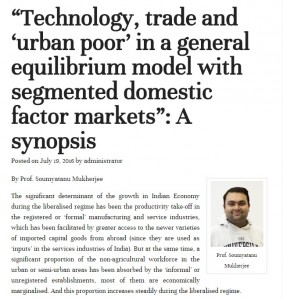Online retailers beware! For consumers there is great disappointment on this particular parameter with pro-digital government policies, demonetisation-triggered e-wallet usage and reduced data costs, online commerce is making rapid strides.
By Prof. Keyoor Purani
Courtesy: financial express, September 4, 2017, http://www.financialexpress.com/opinion/online-retailers-beware-for-consumers-there-is-great-disappointment-on-this-particular-parameter/839789/
With pro-digital government policies, demonetisation-triggered e-wallet usage and reduced data costs, online commerce is making rapid strides. The Meeker 2017 report on internet trends in East Asia concurs this by highlighting Amazon India’s 300% year-on-year growth both in number of SKUs and sellers. But it underlines the beginning of aggressive competition among e-commerce players.
For online retailers, increased returns of merchandise by dissatisfied customers has become a concern. According to media reports, the return rate has gone up by 50% in one year. Sellers such as Amazon, Flipkart and Snapdeal have come together to create a fora such as e Suraksha and have even protested against some e-retailers by a putting large amount of SKUs out-of-stock.
A recent research provides interesting explanation of how a buyer’s trust, satisfaction and intention to repurchase in an online retailing context are influenced by psychological contract violations (PCV). Businesses have guarded themselves legally with fine prints, but PCV could be critical for e-retailers, suggests my study published along with two other professors from the UK in the Journal of Business Research (June 2017). It provides evidence that a mechanism called Structural Assurance (SA) can mitigate the negative influence of PCV on trust and satisfaction, in cases where such violations can’t be avoided.
Every buyer-seller interaction in the B2C online marketplace can be characterised by a psychological contract as online buyers are generally governed by their implicit understanding of the seller’s transactional obligations rather than by explicit rules in legal contracts. Psychological contracts, unlike expectations, are based on perceived promises, and arise when one party believes that another is obligated to perform certain behaviours. They are much broader than economic and legal contracts, and comprise perceptual aspects that cannot be formally incorporated into legal contracts. There are four seller obligations—deliver the product in a timely manner by the promised method; deliver an item that is identical to the one described and shown in the ad; follow the payment policy promised and accept payment; and follow the conditions of sale and honour a return or refund promise. With concerns over logistics and payment, fulfilling these obligations becomes dicey.
PCV is common in online marketplace because buyers and sellers do not engage at a personal level, have non-congruent goals, and may have different understanding of their respective contractual obligations. While a few e-retailers are mindful of this, PCV is central to buyer-seller relationships in e-retailing as online buyers’ behaviours are mainly guided by their perceptions of psychological contracts. So, behaviours such as fraud, product misrepresentation, product delivery delay, failure to acknowledge guarantees, and refusal to follow payment policy could be common underlying sources of PCV in India.
Our research found evidences for negative influence of PCV on customers’ intention to reuse a retailer’s website, and that trust and satisfaction are the mediating mechanisms through which PCV negatively influences the intention to repurchase.
Having known the negative influence of PCV in retaining customers, e-retailers may try to bring down the incidence of such violations that need not be breaking legal contracts but breaching customer trust. However, despite all attempts, it may not be possible to completely prevent PCV.
SA refers to the degree to which consumers believe structures exist to promote the success of online transactions. Credit card guarantee, escrow services (PayPal), ‘seals of approval’, secure e-transactions, return/exchange policies and cash-on-delivery are examples of SA. In fact, Myntra’s try & buy (T&B) is an interesting SA mechanism that is being adopted by e-retailers.
Therefore, it is vital for online retailers to recognise the role of PCV and safeguard customer trust. Also, investments in SA are paramount for preserving buyer trust in the online retailer when PCV occurs. This is important for Indian e-retailers and other emerging economies for two reasons—e-retailers are competing intensely for too few customers, and they are grappling with problems related to logistics and payment gateways that invariably lead to instances of PCV. Hence, e-retailers should conceive strategies for improving SA as perceived by customers.
Finally, investments in SA should not be considered a panacea, as our findings also indicate that its role in preserving buyer satisfaction is effective only when PCV is perceived as low to moderate. Therefore, e-retailers should pro-actively limit the incidence and magnitude of PCV to a minimum.
(Keyoor Purani is Professor of Marketing and Executive Director of IIMK LIVE, a business Incubator and Entrepreneurship Development Centre of IIM Kozhikode. Views expressed are his personal.)
















 Users Today : 144
Users Today : 144 Users Yesterday : 309
Users Yesterday : 309 This Month : 4329
This Month : 4329 This Year : 19934
This Year : 19934 Total Users : 372062
Total Users : 372062 Who's Online : 5
Who's Online : 5